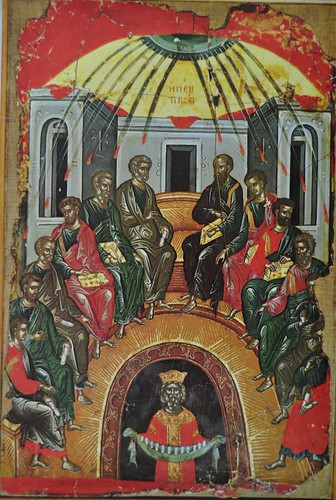The Monday after Pentecost is known as the Day of the Holy Spirit in the Orthodox Church.

Some of the hymns in the Orthodox tradition particularly speak to me or stick out in my mind. This morning during Matins there was this ‘Sessional Hymn’:
 THE FOUNTAIN OF THE SPIRIT RUSHES DOWN TO EARTH,
THE FOUNTAIN OF THE SPIRIT RUSHES DOWN TO EARTH,
MYSTICALLY DIVIDED INTO FLAMING STREAMS,
BOTH REFRESHING AND ENLIGHTENING THE APOSTLES,
FOR THE FIRE BECAME FOR THEM A CLOUD OF DEW,
RAINING ENLIGHTENMENT UPON THEM.
FROM THEM WE HAVE RECEIVED GRACE, BY FIRE AND WATER,//
FOR TRULY THE LIGHT OF THE COMFORTER HAS ILLUMINED THE WORLD!
It is the mixing of metaphors and images which is both entertaining and edifying. The hymn moves between images of water and fire.
The “Fountain” of the Spirit rushes down to earth while being divided into flaming streams
The fire becomes a cloud of dew
The cloud enlightens.
Wonderful images which by their incompatible nature help us understand the mystery of God’s dispensation. Those mixed metaphors drive away wooden literalism and open our minds to marvel at the mystery which is also God’s revelation.
God truly is ineffable, inconceivable, invisible, and incomprehensible as we pray in the Liturgy. So no one image or metaphor can ever properly describe the Triune God. The creative use of fire and water together help us understand the inadequacies of our language for understanding the Holy Trinity.


 “The holiness to which the Church is called is not a matter of escape from the mundane course of human events, from time, or from everything that is not explicitly Christian. The Eucharist is an incarnational meal in which the risen Lord becomes present in the rude stuff of this life, even as he became present in human history through the womb of the Theotokos. The line between the mundane and the holy is here erased because it is precisely as the ordinary, whether a baby or bread and wine, that the Son of God comes to us. The connection to moral theology should be obvious. God claims the physical and mundane things of life as His own in the incarnation. The mystery of the Incarnate Word as fully God and fully human shows that every bit of human nature has been claimed by God in Jesus Christ. A continued participation in that process of claiming occurs when Christ becomes present to us in the Eucharist, when we sacramentally take His body and blood into our body and blood.” (Philip LeMasters PhD,
“The holiness to which the Church is called is not a matter of escape from the mundane course of human events, from time, or from everything that is not explicitly Christian. The Eucharist is an incarnational meal in which the risen Lord becomes present in the rude stuff of this life, even as he became present in human history through the womb of the Theotokos. The line between the mundane and the holy is here erased because it is precisely as the ordinary, whether a baby or bread and wine, that the Son of God comes to us. The connection to moral theology should be obvious. God claims the physical and mundane things of life as His own in the incarnation. The mystery of the Incarnate Word as fully God and fully human shows that every bit of human nature has been claimed by God in Jesus Christ. A continued participation in that process of claiming occurs when Christ becomes present to us in the Eucharist, when we sacramentally take His body and blood into our body and blood.” (Philip LeMasters PhD, 